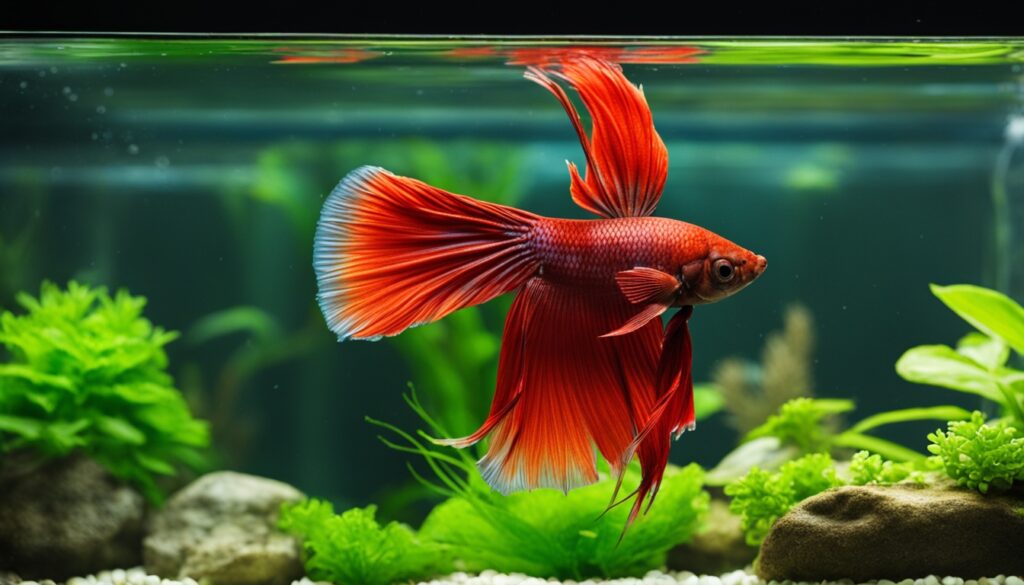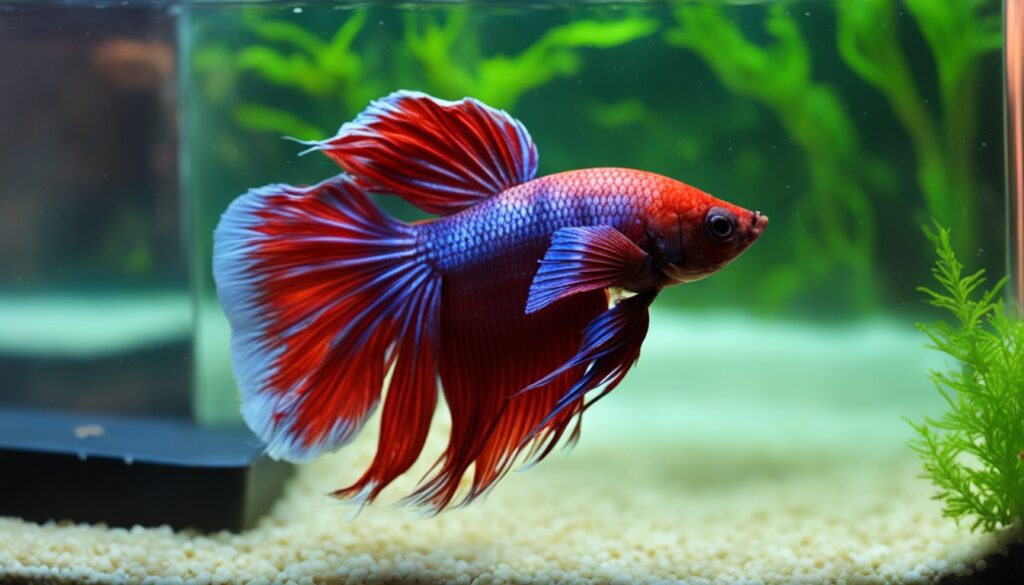Have you ever thought if your colorful betta needs a winter sleep like other creatures? While your home gets colder, do these fish really go dormant? Knowing about betta fish care, sleep, and tropical fish care is key to keep them happy and healthy.
Betta fish don’t hibernate like animals such as bears do. They are tropical fish and like water between 76° to 82° Fahrenheit. If it gets too cold, they might look sluggish. This means they need a warm aquarium, not that they are hibernating.
It’s important to look after your betta’s needs. A aquarium that stays warm is crucial. The right water temperature keeps them active and supports their sleep cycle. This helps them stay healthy. Let’s give our betta fish the best care to help them thrive.
With the correct info and care, pet owners can make sure their bettas stay lively. Understanding betta ‘hibernation’ myths is part of this. Let’s set up a warm tank for them. This keeps their tropical spirit alive, no matter the season.
Debunking the Hibernation Myth of Betta Fish

Many people think betta fish hibernate in cold weather like some animals. We need to understand the truth to take good care of them. This will keep your betta fish healthy and happy.
The Misunderstood Behavior of Bettas in Cold Water
Betta fish slow down in cold water. Some think it’s hibernation. But it’s actually stress because they need warm tropical water. This wrong idea can lead to bad care practices, hurting their health.
How Bettas Differ from True Hibernating Animals
Bettas don’t truly hibernate like some animals that change their body to survive winter. Bettas need warm water to live well. Seeing them “hibernate” means they might be sick from bad tank conditions.
Why Consistent Warm Water is Crucial for Betta Health
The aquarium water should be between 78° and 80° Fahrenheit for betta health. Cold water makes them sluggish and sick. This shows how vital a good water heater and checking the temperature are.
A stable warm environment is essential. It keeps bettas from getting shocked or stressed by wrong temperatures.
Betta Fish Requirement |
Ideal Condition |
|---|---|
Water Temperature |
78° to 80° Fahrenheit |
Environment |
Consistently Warm |
Care Level |
Regular Monitoring & Maintenance |
Health Monitoring |
Watch for Lethargy or Stress Signs |
Knowing what betta fish really need helps us care for them better. This way, we can avoid myths and ensure they live well. Let’s keep our betta fish in great shape with proper care and attention.
The Importance of Regulating Temperature in Betta Tanks

Betta fish are tropical creatures that thrive in warm waters. Keeping water conditions just right is key to their health and happiness. The temperature in their tanks affects how they function. Since bettas are ectotherms, they rely on the water to keep their body temperature steady. It’s very important to keep their tanks in the right tropical temperature range.
Maintaining the Ideal Tropical Range for Bettas
Bettas need a steady temperature between 78° and 80°F to stay healthy. In the wild, they live in warm waters which keeps their metabolism and immune system strong. To replicate this at home, you should use a good aquarium heater and a thermometer. This setup helps avoid torpor, a state of low activity that can occur in cool temperatures. Torpor can make a betta seem sick.
Tools for Ensuring Stable Water Temperatures
To keep your betta’s tank at the right temperature, you’ll need some tools. A good heater is a must, especially when it’s cold. Also, checking the water’s temperature often is important to catch any big changes. Here is a list of what you’ll need:
- A quality aquarium heater with an adjustable thermostat.
- A durable aquarium thermometer for daily monitoring.
- Aquatic thermometers that give you updates all the time can help you worry less.
The Consequences of Temperature Fluctuations on Betta Activity
Changes in temperature can upset bettas a lot. If it happens fast, it can lower their immune system and make them sick. Bettas don’t do well if the temperature is always changing. They might stop swimming much or eating. Keeping the water warm and steady helps them stay healthy and lively.
Keeping your betta’s water clean and at the right temperature is very important. It makes them live longer and stay active. A happy and healthy betta is one that moves around a lot!
Identifying and Supporting Healthy Betta Sleep Habits
I became fascinated with how betta fish sleep and how it affects their health. As their caretaker, it’s important to create a good home for them. Bettas sleep without eyelids and find cozy spots at the tank’s bottom or among plants. They usually sleep for 8 to 12 hours and may take short naps during the day.
Too much sleep could mean a betta is not feeling well. This can happen if the water is too cold, below the best 82.4°F (28°C). I make sure my tank is the right temperature and follow a 14:10 light-dark schedule. This helps bettas keep a normal sleep rhythm and avoids confusion with hibernation. We should use bright lights wisely and not disturb them at night.
I always watch for signs that my betta might be sick, like being more tired than usual. Getting help from a vet quickly is important. Keeping a stable environment and watching your betta closely are key. This ensures they have happy days and peaceful nights. It’s especially important to pay attention to their needs when it gets colder.








